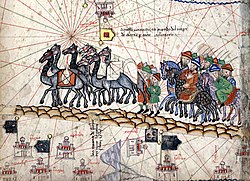Merchant
Merchants are people that deal with trade. That means they buy and sell goods that they do not produce themselves, in order to get profit.
Merchants can be two types:
- A wholesale merchant works between producer and retail merchant. Some wholesale merchants only organise the movement of goods rather than move the goods themselves.
- A retail merchant sells goods to consumers (including businesses), commonly known as retailers. A shop owner is a retail merchant.
In the US, "merchant" is any person while engaged in a business or profession or a seller who deals regularly in the type of goods sold. Under the common law in the United States, merchants are held to a higher standard in the selling of products than those who are not engaged in the sale of goods as a profession. For example, when a merchant sells something, he or she is expected to give a warranty, guaranteeing that the product is fit to be sold, even if there is nothing in writing to this effect.
Related pages
Merchant Media
Merchants in a Southern Port by Thomas Wyck c. 1660
- 16th century costumes of merchants from Brabant and Antwerp.jpg
Costumes of merchants from Brabant and Antwerp, engraving by Abraham de Bruyn, 1577
- PhoenicianTrade EN.svg
Phoenician trade route map
- Fresco from the House of Julia Felix, Pompeii depicting scenes from the Forum market.JPG
Wall painting from Pompeii depicting every day activities at a market-place
- Garum Mosaik Pompeji.JPG
Mosaic showing garum container, from the house of Umbricius Scaurus of Pompeii. The inscription which reads "G(ari) F(los) SCO(mbri) SCAURI EX OFFI(CI)NA SCAURI" has been translated as "The flower of garum, made of the mackerel, a product of Scaurus, from the shop of Scaurus"
Marco Polo was among the earliest European merchants to travel to the Orient, helping to open it up to trade in the 13th century
Mediterranean port with Turkish merchants by Adriaen van der Kabel, 1682



